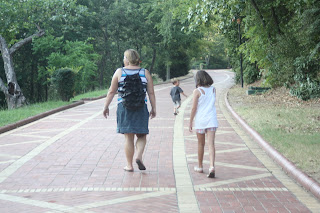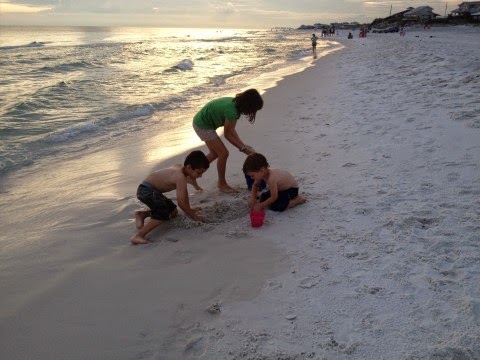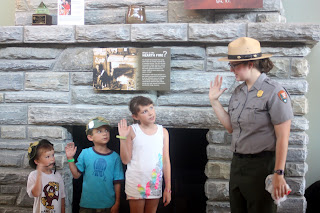The last time the carful of kids were riding the rails through North Carolina on the
Great Smoky Mountain Rail Road. Now we are headed for Asheville, North Carolina, via the
Blue Ridge Parkway--a scenic byway that meanders parallel to I-81 for 469 miles from the Great Smoky Mountains National Park to Shenandoah National Park.
The carful of kids enter the
Blue Ridge Parkway just below the Waterrock Knob Visitor Center, where we check out road conditions and grab our Junior Ranger Badge Workbooks. We check out the Waterrock Knob Trail, despite the light rain and fog. Not many people out today, we hike back down and load back up in the SUV.
The ranger warns us to be careful out on the road because of the fog. Sure, Got it! I am a Mom of a carful of kids--careful is my middle name.
We continue north on the Blue Ridge Parkway and then the fog gets fierce. So many times Melissa and I find ourselves on an unfamiliar mountain road with adverse weather conditions--today it is fog. But we have been through pounding rain with temperatures hovering around freezing on a 12,000 foot mountain pass with zero visibility, a washed-out road in a flash flood and a hail storm so hard that I thought I would loose my windshield.
It is stressful but with Melissa in my passenger seat, all is well. We have been driving together for over 20 years, there is comfort in that.
As we get closer to Asheville, the fog lifts. We stop at the
Folk Art Center on the Blue Ridge Parkway just north of Asheville, where we finish up our Junior Ranger Badges and watch an artisan make a broom.
Next stop--
the Biltmore Estate, an architectural icon and number eight on the American Institute of Architects' (AIA) list of top 150 structures in the United States. I booked online for a discount and they run specials during the summer for free admission for the kids. The Biltmore Estate is open rain or shine, today we got rain.
 |
| The Conservatory |
The Biltmore Estate was built between 1889 and 1895 by George W. Vanderbilt II as an escape for his family; it is still owned and managed by the descendants of the George Vanderbilt family. It is the largest privately held home in the United States.
Vanderbilt commissioned New York architect Richard Morris Hunt to design a house in the Chateau style and it is a notable example of the Gilded Age. Richard Hunt founded the American Institute of Architects (AIA) and designed the facade and the Great Hall of the Metropolitan Museum of Art, the pedestal of the Statue of Liberty and The Breaker's, the Vanderbilt summer home in Newport, Rhode Island.
The Biltmore Estate encompasses 8,000 acres and is bisected by the French Broad River. The grounds were designed by
Frederick Law Olmsted, who designed New York City's Central Park; Vanderbilt wanted the Biltmore Estate to be self-supporting so they had poultry, cattle and hog farms including a diary.
Olmsted instituted the first managed forest in the US at the Biltmore Estate. He designed the shrub garden, the Azalea garden, the Italian garden and the centerpiece--the Conservatory. It houses an extensive collection of palms and tropicals.
The Rose Garden is a magical space with over 2,000 roses surrounding a double arch also covered in roses--it is a must for any rose lover. The Biltmore Estate is the host of the International Rose Trials, plus has an extensive collection of 19th century roses.
 |
| The Carful of Kids. |
As we tour the gardens, the rain will not stop. An umbrella and disposable rain ponchos will only do so much.
We head inside
the Biltmore House but they do not allow indoor photography. The first floor is dedicated to entertaining and is quite grand and luxurious but not ostentatious.
The Biltmore House has a Billiard Room, Banquet Hall, Salon, Music Room, Tapestry Gallery, Library and Winter Garden. The Biltmore Library contains over 10,000 books, half of Vanderbilt's total collection--a testament to his love of reading. All the rooms feature artwork from Renoir and John Singer Sargent. Vanderbilt admired the work of his architects so much, he commissioned Sargent to paint them. Hunt and Olmsted considered the Biltmore Estate one of their greatest projects.
The second floor of the Biltmore House is dedicated to the private bedrooms of the Vanderbilt's. George Vanderbilt's bedroom is quite dramatic with gilded wall coverings with red bedding and upholstery. Mrs. Vanderbilt's bedroom is opulent with gold and aubergine cut velvet and silk.
The third floor is dedicated to guest quarters and then the tour takes us down to the basement where the bowling alley and the indoor swimming pool are located. With a quick peek down the service corridor, the laundry rooms look especially daunting. The final part of the tour is the Bachelor's Wing complete with a Smoking Room and Gun Room.
The Biltmore Estate has created the
Antler Hill Village as another designation on the Estate. This is where you will find the Winery, Outdoor Adventure Center and the farm.
After exploring the Biltmore Estate all afternoon, we are starving. Dinner at
The Moose Cafe is a must, they have the most amazing biscuits and apple butter and the servings are generous.
Up next--a day at the beach.


















































